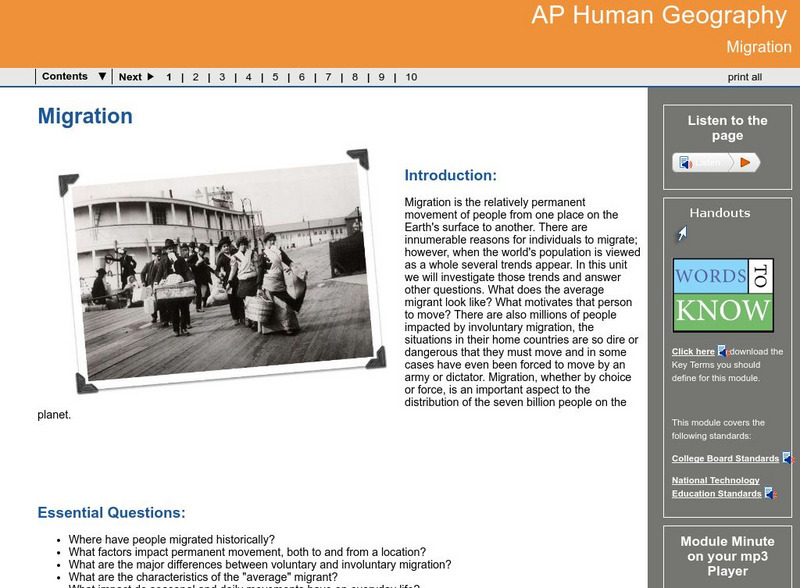Curated OER
How We Get From Here to There
Students recognize various types of movement people rely on to get from one place to another, locate the forms of movement on a map and choose one form of movement and research its path.
Curated OER
Alaska Trade
Students spend two days traveling throughout Alaska, trading as they go. They explore universal principles related to trade and commerce while studying about Alaska's geography and indigenous people. At the end of the lesson, students...
Curated OER
Too Many People Coming a Little Too Fast
Students learn what happens when a city's population grows too rapidly for the city to accommodate it. They examine and discuss examples of cities growing rapidly today, what problems occur with rapid growth, and ways to solve these...
Curated OER
Metropolitan Areas in the USA
Fifth graders explore why people live in certain regions of the United States. They investigate information on specific metropolitan areas such as temperature, population, natural resources, precipitation and landforms. In groups, 5th...
Curated OER
Traveling Along the Indiana Underground Railroad
Students develop a deeper understanding of the role that Indiana played in the Underground Railroad while exploring Indiana Geography.
Curated OER
THE MESOAMERICAN MYSTIQUE
Students research, archeology, historical videos, and travel highlights in the northern region of Central America. They identify the various archaeological / historical sites along with a date of probable existence and the title of the...
Curated OER
Metalling in Around the World
Third graders explore the important leaders in different cultures by researching coinage. Through this process, they also recognize the cultural universality on coinage and currency.
Curated OER
Five Themes of Geography
Students conduct research to determine why geography is important and how it provides information regarding many aspects of the world. They investigate the hemispheres, longitude, latitude and absolute location.
Curated OER
Native Americans
Students, in groups, research various Native American tribes. They wirte a report about the tribe which includes information about their food and ceremonies, among other things. They create a diorama and a poster that shows how they...
Curated OER
Becoming A Local Historian
Students practice the art of being a historian. They compare primary and secondary resources to conduct a critical thinking assignment. Students compare the map of the Baton Rouge area to a modern one in order to make inferences about...
Curated OER
SC Populations Along Major Interstates
Students examine the population among the interstates in South Carolina. Using the internet, they identify the counties and roads and compare it with their own drawing.
Curated OER
How Are Boundaries Made, Kept, Broken?
Students perform raps and analyze issues among the rich and poor. They explore how countries are labeled as "third world" and "first world." They create a dialectical journal and examine the country of Nigeria through the reading of...
Curated OER
How Are Boundaries Made, Kept, Broken?
Students examine the works of Noam Chomsky. They collaborate in small groups to read and identify vocabulary words and historical questions. They answer their questions and role-play as emissaries to locate remaining answers. They...
Curated OER
How Was the Inside vs. Outside Paradigm Created?
Tenth graders write notes from a teacher lecture on Slavery and Exploitation. They review process for notetaking, symbols and abbreviations. They read three web articles about slavery and create a rubric for evaluating the quality of a...
Curated OER
Bird Banter
Students listen to examples of common bird songs of birds found in Illinois. As a class, they discover the importance between the differences in songs and calls. They practice making their own bird calls and songs to end the lesson.
Curated OER
East to West: Africa's Influence on Mexico
Your historians and social anthropologists study the relationship between peoples of ancient Africa and ancient Mesoamerica. They relate in written or verbal form the African presence in the ancient Americas. They create their own...
Curated OER
Home on the Range
Students use maps and mathematics to determine the appropriate panther population in a given area. For this Florida ecology lesson, students research the area requirements of male and female panther and use a map to help calculate how...
Curated OER
Passport to the Eastern Hemisphere
Seventh graders create a time line of significant dates in the history of their nation. This requires students to examine the entire history of a country and make informed judgments based on their historical knowledge.
Curated OER
The Revolving Door: U.S. Immigration
Students compare current cultural perceptions of the immigrant experience with ones of the past. They will relate current immigration stories as seen in the PBS documentary "The New Americans" to those of the historical past.
Curated OER
People and Parks in the U.S.A.
Fifth graders explore the National Parks in the United States. After locating specified states, 5th graders predict which states have the most National Parks. Given the population of each state, students determine the average acre per...
Curated OER
Mussel Movements
Students consider the impact of invasive species on local environments. In this ecology lesson, watch the video, Arizona Wildlife Views, which focuses on invasive species. Students develop vocabulary, relate to meaningful comprehension...
Khan Academy
Khan Academy: Activity: Human Migration Patterns
Use this activity to figure out where the first humans lived. This activity requires students to read clues and use their understanding of the clues to create a map to give them a visual representation of early humans movements.
National Geographic
National Geographic: Human Impacts on Marine Species
Students learn about three examples of human impacts on marine life: migration patterns and shipping, algal blooms and water chemistry, and marine debris. Some of these impacts are due to human activity in the ocean, and some impacts on...
Georgia Department of Education
Ga Virtual Learning: Ap Human Geography: Migration
AP Human Geography learning module on migration explores push/pull factors and migration patterns worldwide and within the United States. Comprehensive materials, multi-media and interactive resources.























